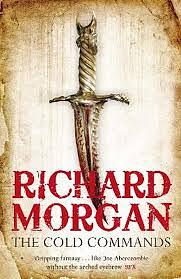Take a photo of a barcode or cover
adventurous
dark
tense
medium-paced
Plot or Character Driven:
Character
Strong character development:
Yes
The Cold Commands, the second book in Richard K. Morgan’s A Land Fit for Heroes trilogy, is a worthy sequel to The Steel Remains. The series deftly twists the tropes of fantasy with a few SF tropes in mix as well. But this series is not for everyone. The violence and sex are graphic but not gratuitous. F-bombs litter the pages like the blood splatters from the protagonist’s fabled sword Ravensfriend. Similes and metaphors are the coin of the writer’s realm. My favorite, metaphor not F-bomb, was the description of crowded city streets “impassible at any pace above that of a snail with a diploma in law”. I am glad that the third book, The Dark Defiles, is already out so I don’t have to wait to see how this story ends.
adventurous
dark
tense
slow-paced
I had a tough time getting through the first half of The Cold Commands. It just felt meandering and a bit aimless because I had no idea where the story was going. Once again, we start off with the 3 main characters from The Steel Remains mostly doing their own thing (despite Egar and Archeth actually being together). I don’t know, but maybe I just want more narrative structure out of the story so I can actually get into the book. I also hated where Ringil’s storyline went with his dream-like hallucinations/travel into the Gray Space that just really confused me because I had no idea what was actually happening versus what he was just experiencing. I had thought that I already understood most of the intricacies after getting through the first book, but this just added another layer of confusion.
A little over the halfway point is finally when the main story actually gets going when all 3 characters are finally together again (at least they are in the same location). The pacing got much faster, the story clearer, and I could appreciate what was going on. But like the first book, the climax was again confined to the last few pages of the book, and it ended quite abruptly, so I wasn’t really left satisfied.
I feel like even more warnings are necessary. There are again multiple graphic gay (and lesbian) carnal scenes, which did not bother me. The egregious one is the facilitation and condoning of a gang rape of an enemy by one of our heroes. I don’t feel like it was necessary to have added this even in a grimdark fantasy.
Overall, The Cold Commands’ first half was a struggle to get through, and although it gets better later on, I was still left wanting.
A little over the halfway point is finally when the main story actually gets going when all 3 characters are finally together again (at least they are in the same location). The pacing got much faster, the story clearer, and I could appreciate what was going on. But like the first book, the climax was again confined to the last few pages of the book, and it ended quite abruptly, so I wasn’t really left satisfied.
I feel like even more warnings are necessary. There are again multiple graphic gay (and lesbian) carnal scenes, which did not bother me. The egregious one is the facilitation and condoning of a gang rape of an enemy by one of our heroes. I don’t feel like it was necessary to have added this even in a grimdark fantasy.
Overall, The Cold Commands’ first half was a struggle to get through, and although it gets better later on, I was still left wanting.
che potenziale!
tre protagonisti così promettenti! veterani decorati, eroi di una guerra incredibile contro una razza rettiliana, ognuno con il proprio diverso bagaglio di traumi, shock culturali, abbandoni e tradimenti:
una giovane semi-aliena di 200(?) anni
un nobile reietto
un selvaggio delle steppe
così tanta diversità in cui scavare profondamente...e invece no!!
queste tre persone così diverse pensano nello stesso modo, agiscono nello stesso modo, parlano nello stesso modo e cioè come un adolescente meschino ottuso e volgare
poteva essere un capolavoro ed è solo una cialtronata di 1400 pagine, fanculo!!!
e a proposito di cialtroneria:
concludere (ripetutamente) un azione che non si sa come chiudere con "e dopo tutto si fece buio" è veramente da cialtroni!!!!!
PS: copierò questo commento su ogni libro della trilogia perchè proprio come non c'è nessuna differenziazione ne crescita nei protagonisti non ce n'è nei tre libri
ancora fanculo!
tre protagonisti così promettenti! veterani decorati, eroi di una guerra incredibile contro una razza rettiliana, ognuno con il proprio diverso bagaglio di traumi, shock culturali, abbandoni e tradimenti:
una giovane semi-aliena di 200(?) anni
un nobile reietto
un selvaggio delle steppe
così tanta diversità in cui scavare profondamente...e invece no!!
queste tre persone così diverse pensano nello stesso modo, agiscono nello stesso modo, parlano nello stesso modo e cioè come un adolescente meschino ottuso e volgare
poteva essere un capolavoro ed è solo una cialtronata di 1400 pagine, fanculo!!!
e a proposito di cialtroneria:
concludere (ripetutamente) un azione che non si sa come chiudere con "e dopo tutto si fece buio" è veramente da cialtroni!!!!!
PS: copierò questo commento su ogni libro della trilogia perchè proprio come non c'è nessuna differenziazione ne crescita nei protagonisti non ce n'è nei tre libri
ancora fanculo!
The rating should be more like 2 1/2 stars, and difficult to give considering how much I enjoyed The Steel Remains. I like the world Morgan has created. I really like the three main characters. I like the grit and darkness. And I like where I think the story is heading. However, so little happened in so many pages. The pacing of this "middle" novel was glacial until perhaps the last third of the book. Oh, the tedium.
Liked this quite a bit. More than the first, I think. It is clearly set up for the next one. I can't wait.
2.5
Slow start but when it got going, it was so good and hard to put down. Much better then the first one.
Slow start but when it got going, it was so good and hard to put down. Much better then the first one.
I loved this book. I really, really did. The pace is slow, the plot is thin, and yet... Morgan continues to wow me with his excellent prose and non-awkward dialogue. This book is clearly meant to be a bridge to the end of the story, which is a purpose it serve very well. If you need something to happen in your stories, this one is sure to disappoint, but I loved it all the same.
Ha lo stesso difetto del precedente - un inizio troppo lento e una risoluzione troppo rapida finale - ma mi è piaciuto di meno per due ragioni:
- è il classico secondo libro di una trilogia, dove succede molto poco perché è preparativo al libro finale, per cui, salvo alcune scene tra i tre protagonisti e le parti con l'imperatore, è noiosetto
- le parti con i poteri sovrannaturali di Ringil le ho trovate troppo esagerate, se non ridicole; a parte l'intenzione di renderle mistiche e strane (con scarsi risultati, a mio parere) non credo che questo personaggio ne avesse bisogno, considerando che era già caratterizzato come un guerriero incredibile con una spada particolare. Le premesse c'erano già nel libro precedente per cui non ne sono stupita, ciò non toglie che abbia trovato il risultato finale fastidioso, perché funziona sempre come un deus ex machina nei momenti topici
- è il classico secondo libro di una trilogia, dove succede molto poco perché è preparativo al libro finale, per cui, salvo alcune scene tra i tre protagonisti e le parti con l'imperatore, è noiosetto
- le parti con i poteri sovrannaturali di Ringil le ho trovate troppo esagerate, se non ridicole; a parte l'intenzione di renderle mistiche e strane (con scarsi risultati, a mio parere) non credo che questo personaggio ne avesse bisogno, considerando che era già caratterizzato come un guerriero incredibile con una spada particolare. Le premesse c'erano già nel libro precedente per cui non ne sono stupita, ciò non toglie che abbia trovato il risultato finale fastidioso, perché funziona sempre come un deus ex machina nei momenti topici






